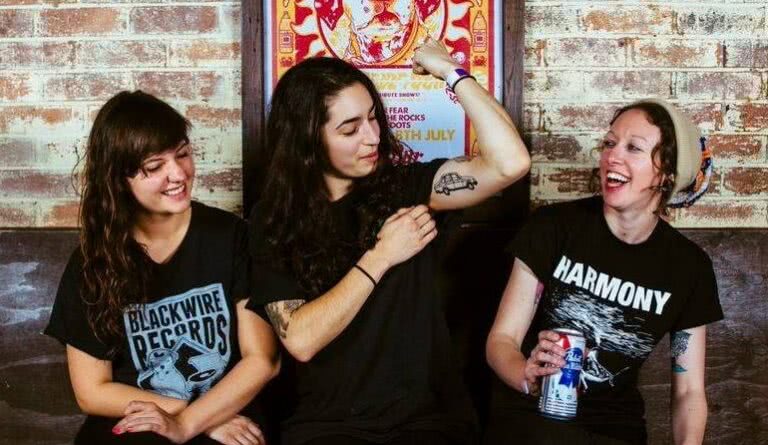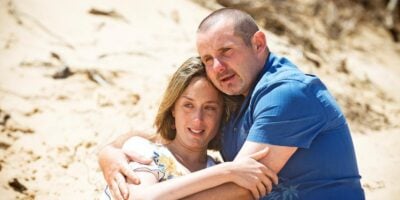Trigger warning: this article contains discussion of physical and sexual assault.
On the eve of the annual Poison City Weekender, Camp Cope released a video titled ‘It Takes One’, a campaign aimed to address the prevalence of sexual harassment and assault at live shows.
The message they want to convey is simple – it only takes one person to hinder another person’s safety and one person to stand up and make a difference. Speaking to the band’s singer Georgia Maq, it becomes clear that they are approaching the issue from a number of different angles – as musicians, as gig goers, and most importantly, as women who love music and want to see their safety prioritised.
Maq admits that the extent of the issue wasn’t immediately apparent to her, but once she became aware of the culture there was no looking away. “When I first started going to bigger punk shows I just kind of accepted that you’d come out of it with heaps of bruises, surrounded by men.”
“But then I realised, ‘Wait, I keep getting beaten up every time I want to be up the front and see my favourite band. I shouldn’t have to get hurt.’ Once you realise that, moshpits become a really political thing. I’d go to shows that’d be all men and I wouldn’t blink an eye. When I started thinking about it, I realised how exclusive it was and how this boys club does exist. I played shows as a female support to an all male lineup for two years of my life. I’m grateful for that for the exposure, but once you see it for what it is you can’t ignore it.”
The fact of the matter is that women are often fearing for their safety in a crowd, spending more time ensuring they don’t get hurt or touched inappropriately and less time enjoying the show. “I’ve found when I used to go hard in the pit my mind was always on protecting myself rather than just enjoying the music,” says Maq.
“I love music. I just want to enjoy it and people who prevent other people from enjoying it are fucked! It should be about the music: it’s about supporting bands and supporting the community. I want to leave a show going, ‘Fuck, that band was awesome’ rather than being like, ‘Someone touched me inappropriately, I’m questioning my self worth and whether I should have dressed differently’.”
Maq recalls a moment with bandmate Kelly-Dawn Hellmrich that made the issue clear to her. “We were up the front getting knocked about during The Hard Aches and Kelly said to me, ‘Boys are not more entitled to music than you are’ and that always stuck with me. I should be able to go up the front and enjoy myself and not get hurt or groped. People who are saying that this doesn’t exist or that the issue isn’t that bad clearly haven’t had to experience it for themselves.”
The issue once again hit close to home for the band when a group of men obstructed people from getting to the front of the crowd. “It was during our show at Crowbar in Brisbane.
“I said to the crowd, ‘OK, all the girls and non-binary people to the front’ and there was a group of boys who wouldn’t move. They took what I said as, ‘Oh, I’m being oppressed’ because when you’ve been on top for so long, equality feels like oppression. These girls in the crowd were yelling to me saying, ‘There’s these people who don’t want to be here’ so I was like, ‘Right, you move back, or I come in there and I move you back’ and they got kicked out.”
It was this moment that made Camp Cope decide to use their platform to start conversations around safety at shows and through this ‘It Takes One’ was born.
Maq emphasises the importance of involving men in these discussions, with the likes of triple j’s Dom Alessio, Jules Rozenbergs from The Bennies and Tyler Richardson from Luca Brasi featured in the ‘It Takes One’ video.
“This is an issue that strongly effects women but women shouldn’t be the ones to fix it. We can’t do it alone. Hopefully this starts a conversation and gets people to come out and say, ‘This happened to me at a show and I’d like the issue addressed so it doesn’t have to happen to anyone else’.
“Men need to realise ‘Maybe I shouldn’t jump around and rub myself on girls. Maybe I should be that one who does something to stop it.’ For bands it’s important that if they see it, they call it out and be like, ‘If you can’t act respectfully you go home.’ People need to be taught to not doubt women, to listen to women. If someone says ‘that guy groped me’ instead of being like, ‘Where’s the proof?’ automatically be like ‘this patron is feeling unsafe because there’s a person that groped them’ and remove the offending person.”
While the initiative specifically encourages people to call out harassment and assault at gigs, what Camp Cope are highlighting is an issue that effects the music industry as a whole. “I think the punk community has a lot of problems but we’re slowly working them out,” says Maq. “The conversation’s starting and people are listening. We’re always striving for change and striving to be more progressive and more inclusive. Those who are listening are doing a fucking great job.”
Maq sums up the ultimate purpose of the campaign perfectly, stressing the importance of changing the perception of what’s considered acceptable at a show. “We’re not taking this anymore: this is not going to be the norm. The norm is going to be that people are equal and people get treated with respect. It takes one – be that one! If everyone does it, then we’ve got positive change. Be the change you want to see in the world.”
If you have experienced sexual assault or abuse and would like to speak to a professional, please contact 1800respect.org.au.

































